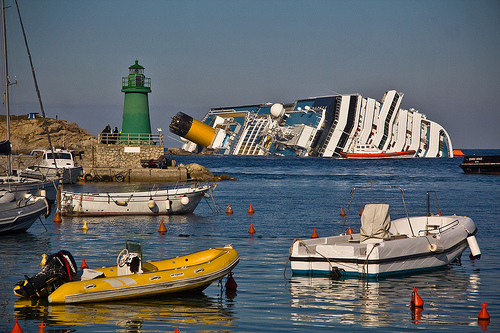- Blog
- Sustainable Economic Systems
- Costa Concordia: Human tragedy & potential environmental disaster
Costa Concordia: Human tragedy & potential environmental disaster

Donate Now!
Your contribution will benefit Friends of the Earth.
Stay Informed
Thanks for your interest in Friends of the Earth. You can find information about us and get in touch the following ways:
The tragic capsizing of the Costa Concordia in Italian waters on January 13, which left at least 16 dead and many more unaccounted for, cast a spotlight on the safety and environmental practices of cruise ships around the world. As search and rescue attempts come to a close the focus is shifting to the 700,000 gallons of bunker fuel onboard the grounded Concordia, which threaten to spill into the protected marine waters along the coast of Tuscany. Salvage companies are poised to pump the fuel out of the ship once search and rescue operations end and hopefully they are able to do that. However the ship is balanced on the reef that it struck, and if it should shift into deeper water its fuel tanks could rupture. Oil spill containment booms and cleanup resources are positioned around the Concordia in the event that the ship falls from its perch but the situation is precarious, especially since it will likely take more than a month to remove the bunker fuel.
While much has been made of the captain’s role in the Concordia accident, we should be focusing more of our scrutiny on the cruise industry as a whole for its cavalier attitude toward operations in ecologically sensitive waters. Cruise ships are notorious for the air and water pollution they produce (some are worse than others: www.foe.org/cruise-report-card), dumping dirty wastewater and pumping air pollutants into the environment and threatening both marine and human populations. They use dirty, bottom-of-the-barrel bunker fuel (except in a few areas like California where cleaner fuel is required) that, if spilled, can cause immense problems from fouling coastlines and beaches filled with tourists to harming our valuable marine ecosystems and fisheries.
Burning bunker fuel also produces tiny particles that degrade air quality and cause illnesses, such as asthma, and death due to lung cancer and heart attacks, as well as emit soot called black carbon that contributes to global warming. In addition, the industry has been accused of under compensating crew members from developing countries and subjecting them to poor working conditions. To round out its bad behavior, the cruise industry has been accused of paying little in the way of corporate taxes. Even during the recent lean economic years when shipping companies and those in the maritime industry struggled, cruise lines continued to post record profits, contradicting arguments from the industry that it can’t afford environmentally beneficial fixes. As the world watches the ongoing crisis in Italy, it is time to take a hard look at the cruise industry and demand that it stop using dirty bunker fuel and transition to cleaner alternatives that are less damaging to public health and our marine environment.
Photo credit: Darkroom Productions, Creative Commons attribution
